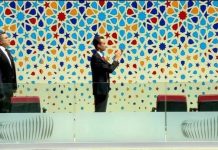Africa-Press – Mauritius. The Chief of Police of the UK was being interviewed about the police handling of the riots that had taken place there, starting in London and spreading rapidly over the next few days to the rest of the country before they were brought under control.
At one point during the interview he was asked his views about the remarks made by Prime Minister David Cameron – and which were taken up again by some other politicians – to the effect that there were too few policemen deployed at the initial stages of the riots, and that the methods they used were inadequate.
For example, it was queried why they had not used water cannons and some other offensive weapons which would have allowed faster and more effective control of the riots. Obviously these remarks were given wide publicity and the police interventions came under public scrutiny.
The Police Chief was quoted in the press as saying that the politicians were right in what they had said, but the Chief denied this and pointed out that he had been misquoted.
What he had said was that he recognized the right of politicians to articulate their views and in fact he welcomed this legitimate political action, which was what politicians were elected for.
However, he noted, having the right does not necessarily mean being right. This was an important distinction to be made and to appreciate because it is linked to the drawing of the lines between political action and political intrusion.
While political action is both necessary and legitimated in a true functioning democracy, political intrusion could quickly degenerate into operational interference, which was clearly undesirable because politicians did not have competence in matters of operations or tactics.
These were best left to those on the ground and at the frontline. They were there precisely because they had received the necessary training and were skilled in using whatever tools and equipment were appropriate for the circumstances and were put at their disposal.
It can be seen that this is perfectly logical, especially when quick decisions have to be taken for immediate action. This cannot await ivory tower deliberations which can come later if need be, and the whole situation reviewed if necessary so as to identify any shortcomings that may have been present, and the necessary corrective measures taken in future.
In fact, politicians need not even come in for this process, which all competent departments engage in on their own as a matter of routine, just as they have an operational methodology based on set principles to initiate interventions.
Reference was made to the way that riots were dealt with in Los Angeles in the famous Rodney King case, and comparisons drawn. Rightly, the UK Chief indicated that the response they had initiated was based on the British model, which may be perceived as soft but which in their experience was the better suited to their context in all its aspects.
Thus, simply advocating the American model was rather simplistic, because it does not take into account the specificities of the UK. However, the Chief was prepared to look at what had happened in greater detail, an exercise which had already begun, and would be prepared to apply lessons learned elsewhere and which had proved their worth.
This scenario is not unknown in Mauritius, where it is even more common for politicians to interfere in operational matters, to the detriment of sane institutional functioning.
Such possibilities are being strongly evoked in the ongoing live show, namely the MedPoint affair, and at every turn the possibility that such interference may have taken place is growing bigger.
With Presidential remarks about the way that ICAC is conducting its business, we are slipping even further down this slippery and dangerous road of political intrusion in procedural matters at different levels.
There is a strong public perception of political intrusion in relatively straightforward matters such as transfer of officers, granting of leave and so on, where the absence of criteria – or flouting of existing ones – seems to be commonplace, so as to accommodate the whims of politicians.
This is, to say the least, very unfair to those who do not have access to politicians. The latter should be the first ones, to begin with, who should insist on principles being set out and adhered to.
In sum, political intrusion into operational issues can only do harm to the country, besides frustrating the people who, feeling victimized, will refrain from giving the best of themselves.
The polity has to decide whether that is the kind of workforce that it desires and whether such a workforce is likely to achieve the strategic goals the country sets. It is generally agreed that competent people should be allowed to do their job in peace. If only that were understood by nosey politicians!
For More News And Analysis About Mauritius Follow Africa-Press







